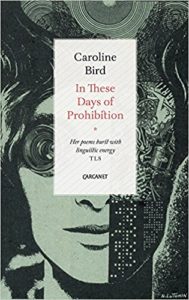British poet Caroline Bird began her literary career as something of a prodigy; her first collection of poems was published when she was only 15. Since then, her career and her reputation have only grown, verifying that the first collection was not a one-off. And she’s also branched into performance poetry and writing for the theater.
Her poetry is known for its strength of language, and its vivid, and often jarring, use of words and metaphors. Reviewers often use the word “vigorous” to describe her poems. Her latest collection, In These Days of Prohibition, significantly adds to her reputation for her use of language.
“Jarring” is the right word to describe these poems. A poem about a family Christmas is about that, but it’s also about a father who’s a “fruitarian,” a relative who finds a suicide note (that doesn’t sound like one) in his Christmas cracker, and a mother who distributes strange presents, like empty chocolate boxes (what could be worse than an empty chocolate box as a gift?). “Patient Intake Questionnaire” includes some of the strangest questions ever asked at a hospital (Has your pillow developed a strange echo? When barefoot, do your shoes feel too tight?). And then there’s that poem about a toddler creating thunder by dancing on a manhole.
These are poems about language—not playing with language, but employing language with a serious intent. Bird’s use of imagery is powerful and unsettling. Consider “I’ve Been Away,” about identity and its loss, and perhaps even the risks of relationship.
I’ve Been Away

like oversized gloves, as if
stock got lost in transit, stuffing
was mislaid; sediments of spirit.
But then, isn’t that the risk? When
you vacate your skin, there’s no
guarantee of full restitution—
a thread of yourself might snag
on the fibres of another drifter,
forming a splinter soul, two strands
knotted in a spinning clump
somewhere, out there, in the gloom:
unable to return to themselves,
unable to fuse into completion,
unable to disentangle, coalesce,
make plans, or grow bones.

Caroline Bird
Bird, both a poet and a playwright, has published Looking Through the Letterboxes (2002), Trouble Came to the Turnip (2006), Watering Can (2009), and The Hat-Stand Union (2013). Her plays include The Trojan Women After Euripides, which premiered in 2012; Play Chamber Piece (2013); and a retelling of The Wonderful Wizard of Oz (2015). She’s received several literary recognitions and poetry prizes, and her poems have been published in numerous literary and poetry magazines. She lives in London.
In These Days of Prohibition is a wildly creative collection, using language, images, and metaphors to see the meaning of ourselves and the life around us in very different and unexpected ways.
Photo by Shannon Wise, Creative Commons, via Flickr. Post by Glynn Young, author of the novels Dancing Priest and A Light Shining, and Poetry at Work.
__________________________

“I require all our incoming poetry students—in the MFA I direct—to buy and read this book.”
—Jeanetta Calhoun Mish
- Poets and Poems: Michelle Ortega and “When You Ask Me, Why Paris?” - April 10, 2025
- Robert Waldron Imagines the Creation of “The Hound of Heaven” - April 8, 2025
- Poets and Poems: Luci Shaw and “An Incremental Life” - April 3, 2025

Bethany R. says
“a thread of yourself might snag
on the fibres of another drifter,
forming a splinter soul…”
Wow. What a fascinating collection and poet. Thank you for introducing us.
Glynn says
I just read today that this collection has been shortlisted for the T.S. Eliot Poetry Prize.
Bethany R. says
Oh my. I would love to read it.
Sandra Heska King says
What Bethany said.
And the hospital questionnaire questions. My mom would have loved those. She got so irritated at the normal and repetitive ones.